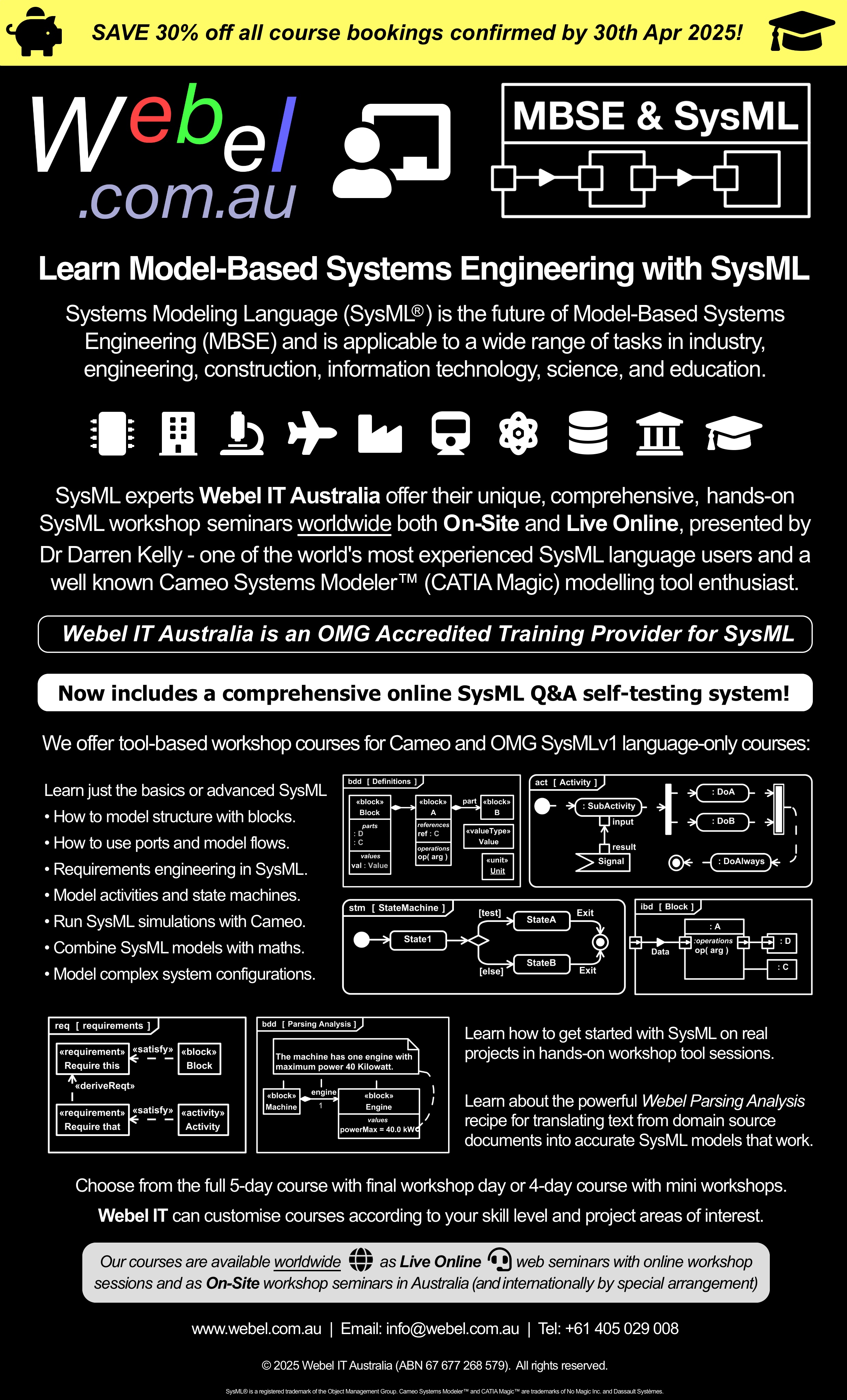Welcome! You may have been referred to this page from a LinkedIn Group or a Mathematica community page or forum. This page may help you find what interests you most.
Webel IT Australia is delighted to announce a new technical slide trail on the Webel libraries for Mathematica and the Wolfram Language, with Systems Modeling Language v1 (SysML®) models using the Webel SysML4Mathematica (v1) recipe:
This is a very detailed and technical slide trail (not a tutorial), one that will be maintained and progressively updated for many years to come. The underlying Wolfram Language code libraries are currently not available to the public, but you may still find the comprehensive examples in the slides of applications of the libraries and how Systems Modeling Language v1 (SysML®) is used throughout interesting, and some the related Policy Notes and coding conventions could be adopted easily without access to the full Webel libraries for the Wolfram Language. Some slides do include some code snippets.
The trail is split into sections, some of which overlap, and some of which handle completely separate topics.
If you wish to understand exactly what the slide trail is for and how it is organised it's best to read all of the intro page and the introduction to each section, otherwise you may wonder what some Webel-specific notations and conventions mean, why some things are done as they are, and what each section is for. But since some sections handle topics that may not be of interest to everyone, the following Links Guide may help you find what is of immediate interest to you.
Over the next weeks many individual examples with detailed explanations will be posted on LinkedIn Groups and the Wolfram Community forums. Until then, this Links Guide may help you find your way through the many slides and sections:
"I'm interested in the Webel SysML4Mathematica modelling recipe and how it helps development of very complex Wolfram Language projects"
Visit: Which are supported by:"I'm interested in the coding conventions for the Wolfram Language used by Webel"
If you skip these you may be left wondering about some of the conventions used in later sections, but if you are keen to just get to application examples and case studies just skip them, you can always just use the many cross-linked Policy Note pages or visit particular relevant slides as needed: Note that some of these coding conventions are chosen to "play nicely" with the Wolfram Language Plugin for IntelliJ IDEA and with the SysML modelling (which was done in the MagicDraw/Cameo tool)."I'm interested in the very low-level Webel utility packages and the Webel help registry system."
The utilities section is not a high priority and the packages discussed have some basic low-level functions that would be obvious to most Mathematica users. The section on the Webel help registries for rich help for package functions and class "methods" (for MTools classes and Webel Abstract Data Type (ADT) pseudo classes) and::usage generation is more likely to be of interest to Mathematica users.
"I'm interested in the user-contributed MTools package for classes and object-orientation in the Wolfram Language and how it is extended by Webel classes. "
It will help if you've viewed the section on the Webel help registries and at least had a glance at the section on the SysMLv1 modelling recipe: There's a nice example of use of a Webel MAll MTools extension in this small physics case study trail section for the MPsy class: (Unfortunately at the time of writing some of the case studies for the Webel MTools extensions can't be made public, but there are some examples in other slide trails elsewhere on the Webel site. The Webel MTools extensions have been applied with great effect to some very complex air conditioner heat exchanger simulation and refrigerant circuit component modelling tasks, examples may become available later.)"I'm interested in the Webel recipe for Abstract Data Types (ADTs) as adapted from a technique originally by Roman Maeder and extended to include inheritance"
Finally, Dr Darren of Webel IT Australia has a special request to all guests:
The Webel libraries for Mathematica make for very special reasons (such as Webel's projects combining Mathematica with Systems Modeling Language) heavy use of object-oriented and class-related coding strategies for the Wolfram Language, such as extensions to the user-contributed MTools for classes and OO, and the Webel Abstract Data Type (ADT) stateless pseudo classes with inheritance as described in this trail in detail. Feedback on the trail content is welcome (my time responding may be very limited), but I'd ask you to please not engage in debates about the pros and cons of use of classes and OO strategies for the Wolfram Language. If you can work without such just more traditional use of the Wolfram Language that's good; for the SysML-oriented Webel projects use of classes and some OO strategies is crucial and has proven extremely useful. Whether or not that's "the Mathematica way" is please completely out-of-scope for discussions regarding this trail.
If you provide feedback please provide links to specific slide pages. Please be aware that my time for unpaid activities is limited, and responses may be limited to links to related explanatory slides or Webel Policy Note pages.
I hope you enjoy this highly technical slide trail and perhaps gain some benefit from your time spent examining any part of it.
Dr Darren, Webel IT Australia, Aug 2024

